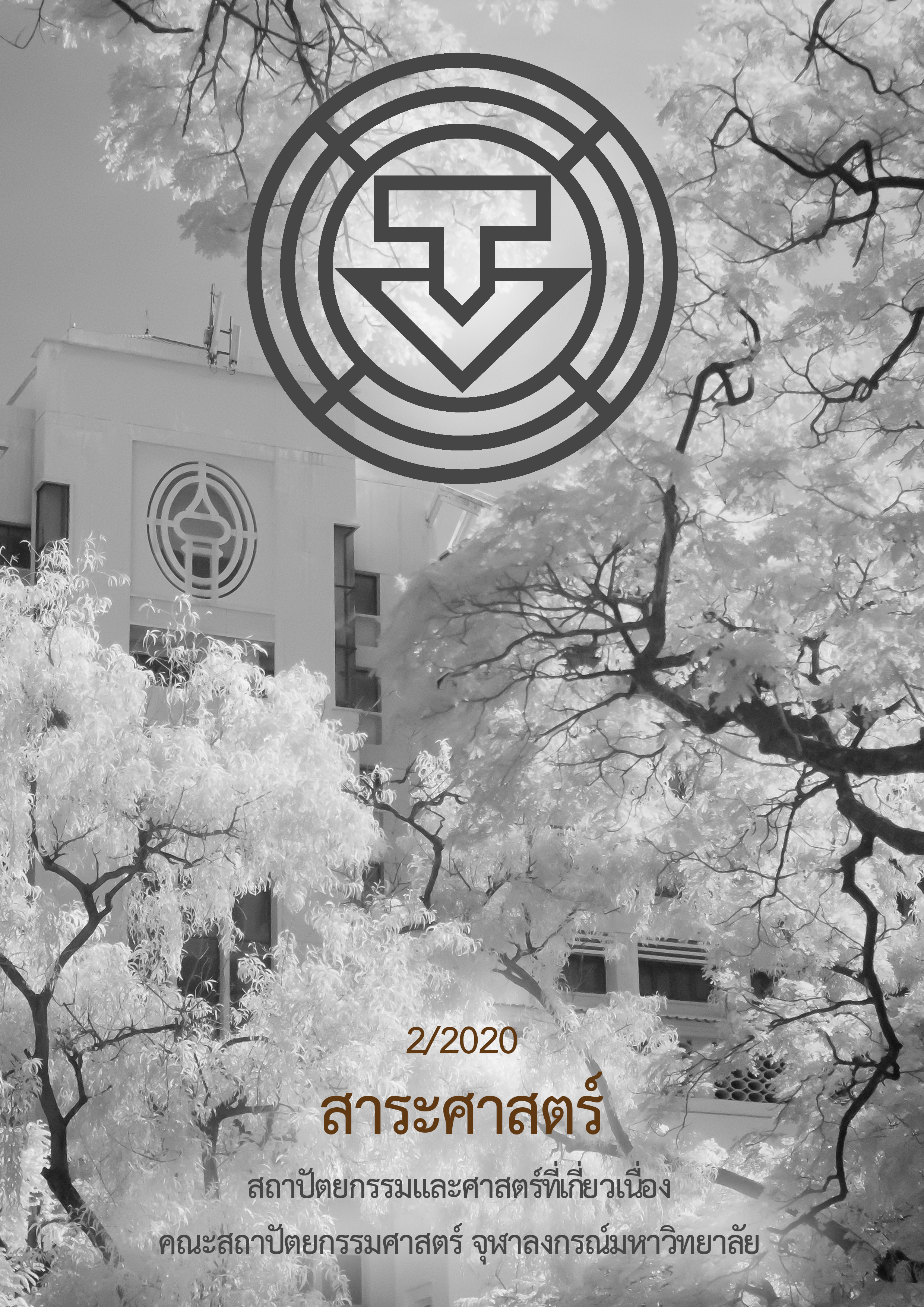พฤติกรรมผู้อยู่อาศัยในการใช้งานอุปกรณ์เทคโนโลยีที่ติดตั้งมากับคอนโดมิเนียมของบริษัท แสนสิริ จำกัด (มหาชน)
Main Article Content
บทคัดย่อ
บริษัท แสนสิริ จำกัด (มหาชน) (บมจ.แสนสิริ) ริเริ่มนำเทคโนโลยีมาพัฒนาโครงการที่อยู่อาศัยตั้งแต่ในปี 2560 ซึ่งเน้นการใช้เทคโนโลยีในโครงการคอนโดมิเนียมเพื่อส่งเสริมการอยู่อาศัยให้ดียิ่งขึ้น ด้วยการติดตั้งอุปกรณ์เทคโนโลยี 3 ประเภท คือ (1) ประเภทความปลอดภัย (2) ประเภทสนับสนุนการดำเนินชีวิต และ(3) ประเภทการจัดการพลังงานและทรัพยากร งานวิจัยนี้มุ่งศึกษารูปแบบอุปกรณ์เทคโนโลยีที่ติดตั้งในคอนโดมิเนียมของบมจ.แสนสิริ ในเขตกรุงเทพมหานคร โดยศึกษาคอนโดมิเนียมที่แตกต่างกัน 4 ระดับราคาประกอบด้วยโครงการระดับหรูหราพิเศษ, ระดับหรูหรา, ระดับชั้นสูง และระดับชั้นดี โดยรวบรวมข้อมูลรายละเอียดอุปกรณ์เทคโนโลยีที่ติดตั้งในคอนโดมิเนียม จากการค้นคว้าทางเว็บไซต์กับการสัมภาษณ์นิติบุคคลในโครงการ และศึกษาพฤติกรรมการใช้งานอุปกรณ์เทคโนโลยีของผู้อยู่อาศัยในคอนโดมิเนียมทั้ง 4 ระดับราคา ด้วยการสัมภาษณ์กลุ่มตัวอย่างผู้อยู่อาศัย 226 ตัวอย่าง เพื่อวิเคราะห์ผลเปรียบเทียบความความแตกต่างในโครงการกรณีศึกษาทั้ง 4 โครงการ
จากการศึกษา พบว่า (1) อุปกรณ์เทคโนโลยีพื้นฐานที่มีการติดตั้งในโครงการทุกระดับราคาคือ อุปกรณ์ประเภทความปลอดภัยและประเภทสนับสนุนการดำเนินชีวิต เช่น ระบบคีย์การ์ดเข้า - ออกและแท่นชาร์จรถไฟฟ้า ซึ่งโครงการที่มีจำนวนหน่วยพักมากจะมีการติดตั้งอุปกรณ์เหล่านี้จำนวนมากเช่นกัน นอกจากนี้ พบว่า ในโครงการระดับหรูหราขึ้นไปมีการติดตั้งอุปกรณ์ประเภทการจัดการพลังงานและทรัพยากรพร้อมทั้งอุปกรณ์เทคโนโลยีพิเศษนอกเหนือจากอุปกรณ์พื้นฐาน ซึ่งไม่พบในโครงการระดับราคาต่ำกว่า (2) พฤติกรรมการใช้งานอุปกรณ์เทคโนโลยีของผู้อยู่อาศัยทั้ง 4 โครงการ มีความถี่ในการใช้งานอุปกรณ์ด้านความปลอดภัยเป็นประจำ ขณะที่ไม่นิยมใช้งานอุปกรณ์ด้านสนับสนุนการดำเนินชีวิต (3) ผู้อยู่อาศัยมีความพึงพอใจในอุปกรณ์ด้านความปลอดภัยในระดับมาก ขณะที่มีความพึงพอใจอุปกรณ์ด้านสนับสนุนการดำเนินชีวิตในระดับน้อย เนื่องจากไม่ค่อยมีการใช้งาน นอกจากนี้พบว่า โครงการระดับราคาหรูหราขึ้นไปผู้อยู่อาศัยมีความพึงพอใจอุปกรณ์ด้านความปลอดภัยมากกว่าโครงการระดับอื่น ๆ ทั้งนี้โดยส่วนใหญ่ผู้อยู่อาศัยยังไม่พบปัญหาในการใช้งาน กรณีที่พบปัญหามักเป็นปัญหาอุปกรณ์ไม่ทำงาน อุปกรณ์ทำงานล่าช้า มีความซับซ้อนในการใช้งาน เสียหายบ่อย และอุปกรณ์ไม่เพียงพอในโครงการที่มีหน่วยพักที่มาก
งานวิจัยแสดงให้เห็นถึงการติดตั้งอุปกรณ์เทคโนโลยีและพฤติกรรมการใช้งานของผู้อยู่อาศัยในคอนโดมิเนียมในระดับราคาที่แตกต่างกัน ซึ่งมีรูปแบบของอุปกรณ์ และพฤติกรรมการใช้งานที่แตกต่างกัน เพื่อเป็นประโยชน์ต่อผู้ประกอบการในการพัฒนาโครงการคอนโดมิเนียมที่ติดตั้งอุปกรณ์เทคโนโลยีส่งเสริมการอยู่อาศัยโดยมีความคุ้มค่าและตอบโจทย์แก่ผู้อยู่อาศัยต่อไป
Article Details
เอกสารอ้างอิง
นิติ รัตนปรีชาเวช. “นวัตกรรมในอสังหาริมทรัพย์.” วารสารวิจัยและสาระสถาปัตยกรรม/การผังเมือง 8, 2 (มิถุนายน 2554): 127-138.
Brandage. “เพราะอสังหา คือ “ระเบิดลูกที่ 5” แสนสิริ จึงต้องคิดแบบ Pro Active.” สืบค้น 6 กันยายน 2562. http://www.brandage.com/article/10960/Sansiri.
พูนเพิ่ม เสรีวิชยสวัสดิ์. “การยอมรับและการใช้เทคโนโลยี: บทบาทสำคัญต่อพฤติกรรมเชิงสร้างสรรค์ของบุคลากรในอุตสาหกรรมไมซ์ของประเทศไทย.” วารสารวิทยาลัยดุสิตธานี 13 (กันยายน-ธันวาคม 2562): 505-517.
วทัญญู รัศมิทัต. “ปัจจัยที่ส่งผลต่อการใช้งาน ความพึงพอใจ ประโยชน์สุทธิ และการบอกต่อของผู้ใช้งานสมาร์ทโฮมผ่านสมาร์ทโฟนในเขตกรุงเทพมหานคร.” เศรษฐศาสตร์และบริหารธุรกิจปริทัศน์ 14 (กรกฎาคม – ธันวาคม 2561): 42-57.
วาโร เพ็งสวัสดิ์. สถิติประยุกต์สำหรับการวิจัยทางสังคมศาสตร์. พิมพ์ครั้งแรก. กรุงเทพมหานคร: สำนักพิมพ์สุวีริยาสาส์น, 2553.
วาสนา คุณประเสิรฐ. “ธุรกิจอสังหาฯในยุคเทคโนโลยีเปลี่ยนโลก ความต้องการที่เปลี่ยนไปของลูกค้ายุคใหม่!!.” สืบค้น 6 กันยายน 2562. https://www.prop2morrow.com/2019/03/12/ธุรกิจอสังหาฯในยุคเทคโนโลยีเปลี่ยนโลกความต้องการที่เปลี่ยนไปของลูกค้ายุคใหม่.
สราวุฒิ ปลิกแสง. “ความต้องการในคุณสมบัติของอุปกรณ์สมาร์ทโฮมสำหรับบ้านและคอนโดมิเนียมของลูกค้า บริษัท บี-อินโนเวชั่น ดีเวลลอปเมนท์ จากัด เขตกรุงเทพมหานคร.” วิทยานิพนธ์ปริญญามหาบัณฑิต สาขาวิชาการตลาด คณะบริหารธุรกิจ มหาวิทยาลัยรามคำแหง, 2561.
สิงหะ ฉวีสุข. “ทฤษฎีการยอมรับการใช้เทคโนโลยีสารสนเทศ.” KMITL Information Technology Journal (มกราคม- มิถุนายน 2555): 10-21.
อภิพงศ์ เผือกอิ่ม. “ปัจจัยที่มีอิทธิพลต่อความตั้งใจใช้บริการสมาร์ทโฮมของผู้บริโภคในกรุงเทพมหานคร.” วิทยานิพนธ์ปริญญามหาบัณฑิต คณะบริหารธุรกิจ มหาวิทยาลัยกรุงเทพ, 2560.
Marikyan, D. “The Effect of Behavioural Beliefs on Smart Home Technology Adoption.” In UK Academy for Information Systems Conference Proceedings,1-17. Newcastle: Newcastle University Business School, 2019.
Ozkan, N. “A Comparison of Consumer Perceptions Towards Smart Homes in the Uk, Germany and Italy: Reflections for Policy and Future Research.” Technology Analysis and Strategic Management (November 2014): 1176-1195.
Venkatesh, V. “Consumer Acceptance and Use of Information Technology: Extending the Unified Theory of Acceptance and Use of Technology.” MIS Quartery 36, 1(March 2012): 157-178.


